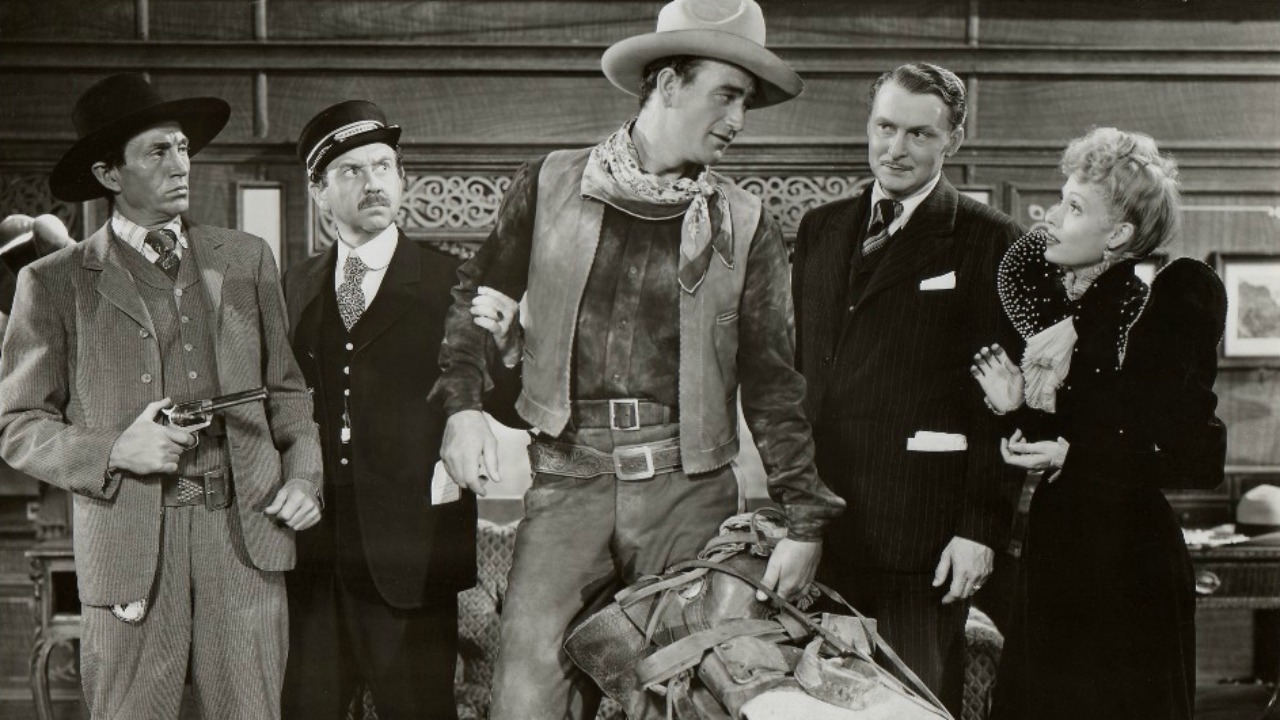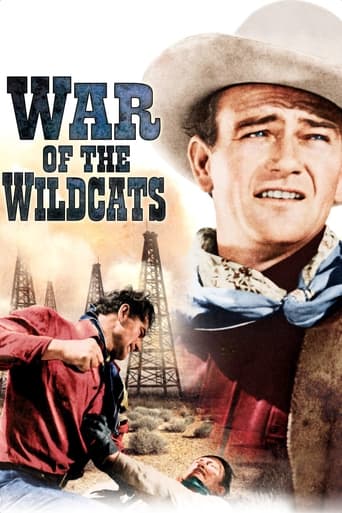Nonureva
Really Surprised!
DipitySkillful
an ambitious but ultimately ineffective debut endeavor.
Teddie Blake
The movie turns out to be a little better than the average. Starting from a romantic formula often seen in the cinema, it ends in the most predictable (and somewhat bland) way.
Tyreece Hulme
One of the best movies of the year! Incredible from the beginning to the end.
utgard14
I didn't expect much from this one but it's better than it has any right being. On the surface it looks like an ordinary, run-of-the-mill B western with cowboy John Wayne leading a revolt against greedy oil baron Albert Dekker. Oh and the obligatory pretty school teacher Martha Scott, who catches the eye of both Wayne and Dekker. But it's actually a fun little movie that captures your attention and never drags. Wayne and Dekker play their white hat/black hat parts well, and Scott is charming with a nice chemistry with Duke. Supporting cast features greats like Gabby Hayes, Marjorie Rambeau, and Paul Fix. And just wait until Teddy Roosevelt shows up. That was my favorite part.
Edgar Allan Pooh
. . . following his first Tour of Duty in the Philippines (BACK TO BATAAN and THEY WERE EXPENDABLE were his subsequent Filipino forays). Big Oil tries to cheat the Native Americans IN OLD OKLAHOMA, but just as pharmacist Wayne gunned down all the would-be Gold Rush claim jumpers IN OLD CALIF0RNIA, cowboy Wayne guns down all the oil field saboteurs here. When the oil's not being pumped, Wayne finds time to fall for a lady novelist, just as he'd later do in WITHOUT RESERVATIONS. But despite this confluence of "old" states, Pacific TDY's, writer chicks, and reservations, the main focus here is on Oil Industry Shenanigans. We've all experienced these personally: Gas was 89 cents per gallon during the Clinton Presidency, and it was a same price--at least for awhile--with Obama in the White House. But when Oil Giant Enron bribed the U.S. Supreme Court Rich People Party "Justices" to appoint a patently Unconstitutional team of TWO Texas Oil Men Election LOSERS to our Highest Offices, the price of gas stayed North of $4 per gallon for Eight Longggg Years, as all Heck broke loose with 9-11, Katrina, Iraq, and Afghanistan murdering many thousands of Americans (who'd be alive Today if the Rich People's Party had not prevented Clinton from serving four terms in office, as did our great leader FDR). If Wayne had been around 15 years ago, no doubt he'd have gunned down all of these Oil Crooks!
Spikeopath
John Wayne & Albert Dekker compete for oil rights on Indian territory, and for the attention of Martha Scott in this Republic Pictures film shot out of Utah, USA.An interesting Western of sorts due to its characters and its more modern setting, with Wayne & Dekker playing the old and new factions of the West. It's based on a story by Thomson Burtis who co-writes the script along with Eleanore Griffin and Ethel Hill. Albert Rogell directs in the workmanlike way that befits his career. A pretty mundane story is in truth saved by its final third, where thankfully the action picks up and we are treated to something resembling a pulse. The light hearted approach to the romantic strand doesn't sit quite right, and a glorious fist fight between the two protagonists is ruined by Rogell being unable to disguise the stunt men doing the work. But hey, stunt men deserve their moment of glory always. Solid support comes from George 'Gabby' Hayes and Wayne as usual has much screen charisma, particularly when rattling off his pistol. But in spite of its better than usual Republic budget, it remains a film of interest only to 1940s Wayne enthusiasts. 4/10
JoeytheBrit
One of Poverty Row studio Republic's intermittent big-budget efforts, War of the Wildcats is a lively, if fairly routine, western notable for its early 20th-century setting. Wayne plays Daniel F. Somers, formerly one of Teddy Roosevelt's rough riders, who finds himself entangled in a love-and-oil battle with Albert Dekker. Wayne is fairly amiable here, representing the old west and the little man forced to adapt in the face of modern technology and the dawn of big business. Dekker, of course, represents this future. He drives one of them new-fangled auto-mobeels and is erecting oil wells just as fast as he can. He is also dismissive of the native population – he even has one, a Cherokee, scrub his back as he takes a bath – while Wayne shows them respect and receives it in return. I'm not quite sure how that stacks up today, given our knowledge that the treatment of the native American by the old west fell somewhat short of what can be considered fair.Anyway, possibly the best aspect of this film is that Dekker's character isn't portrayed as an out-and-out villain, driven only by greed. He is smart and relatively sophisticated, and also brave. Anyone who has ever had the experience of working with or for a 'captain of industry' (for want of a better term) or a self-made man, will probably recognise oilman Gardner's characteristics exactly as those that account for the success of these people. They aren't necessarily bad people, just ruthless enough to do whatever is necessary in pursuit of their goals.Martha Scott is a fairly bland heroine – it's difficult to see why such rugged individuals as Somers and Gardner would both be so keen to bed her. Gardner's frankness in this matter is also refreshing given the times in which this film was made. He makes no secret of what he desires from Catherine and doesn't resort to any particular underhand tactics to make his desires come true. Of course, he doesn't succeed – it would be another quarter of a century before Hollywood would allow a character like Jim Gardiner to win the girl (and the oil).

